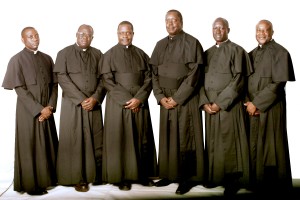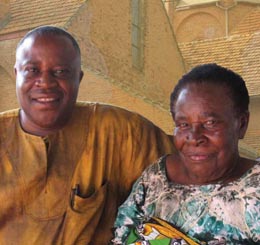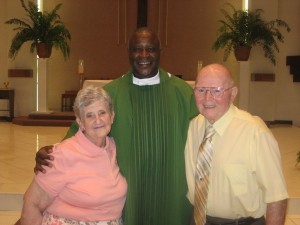[B]ut those who wait for the Lord shall renew their strength,
they shall mount up with wings like eagles,
they shall run and not be weary,
they shall walk and not faint. [Isaiah 40:31]
[L] Professor Emmanuel M. Katongole. [M] Fr Katongole with fellow silver jubilarians. [R] Fr. Katongole with his mother, Magdalene Namatovu.
Fr Emmanuel Katongole is a long-time friend, stretching back to our student days in Louvain, Belgium from the 1990s. There, we enjoyed long discussions on common topics of research-interest, and had our regular Sunday afternoon walks together, followed by high tea.
Father Katongole grew up in the midst of the regime of Idi Amin and the outbreak of HIV/AIDS. He was the child of Rwandan refugees who fled to Uganda in the early 1940’s and grew up as a person “in between” multiple identities; his father was a poor Rwandan Tutsi farmer, and his mother was a wealthy Hutu. Growing up as a recent immigrant, Dr. Katongole also grew up in between national identities. Fr. Katongole was ordained as a Roman Catholic priest by the Kampala Archdiocese in 1987. Since his ordination he has served parishes in Africa, Belgium, and the United States. He earned his Ph.D. in philosophy and M.A. in religious studies from the Catholic University of Louvain, Belgium. He joined the faculty of Duke Divinity School in 2001 and served as the Associate Professor of Theology and World Christianity. Professor Katongole’s teaching and research interests cover a wide range of issues related to theology and violence especially in Africa. He has published many books, including his latest The Sacrifice of Africa. As the Senior Strategist and a founding co-director of the Center of Reconciliation at Duke Divinity School, he has become a leading global theologian in reconciliation. On invitation, Katongole will begin his appointment at the Kroc Institute of the Notre Dame University in January 2013. In addition to teaching theology courses at Notre Dame, he will direct a research centre on Catholicism in the global South.
On June 30, 2012, Fr Katongole and five classmates in the seminary celebrated the silver jubilee of their priestly ordination. Unfortunately, our plan to attend the event at Kampala had to be vacated in view of our teaching engagement at the De La Salle University-Manila. We have asked Fr Katongole to do a guest-post for this website and are delighted to publish the following which he sent us. This article was first published in his Priestly Silver Jubilee Celebration (1987-2012) souvenir magazine, the front cover of which features a quote from Psalm 116:12-13:
- How can I repay the Lord, for all his goodness to me? I will raise the cup of salvation and call on the name of the Lord.
FAMILY
I was born on November 27, 1960 at Malube village in present day Muduuma Parish, 16 miles off Kampala – Fort Portal Road. My parents migrated from Rwanda in the early 1950s to Kyamulibwa in Buddu, then Mitala Maria, before finally settling in Malube, where I was born. The fifth born child of Anthony Bukerimanza and Magdalene Nyiraruhango, I was born in a family of 7 children: 1 girl and 6 boys. An elder brother, Joseph Kakooza is also a priest (ordained in 1985) and is currently the rector of the Cathedral parish in Kasana Luweero Diocese. When I was in Primary five in 1972, my father passed away, leaving my mother with the near impossible task of raising us during very challenging situation of poverty, insecurity (of Idi Amin’s time), the Luweero war and a number of other difficult family challenges. Needless to say, we are all very proud of her and grateful to God for the gift she is. This year in October she will be 87 years!
EDUCATION
I did my primary education at St. Henry’s Primary School, Kisammula (1967-74). My secondary education was at Nnyenga seminary (1975-6) and Kisubi Seminary (1977-8). From 1980-83, I was in Katigondo National Seminary, followed by a year of pastoral spiritual internship at Nswanjere Junior Seminary, before joining Gaba National Seminary, 1985-7. Ordained a deacon on 21st September, 1986, I was ordained to the priesthood on 28th June 1987, by the late Bishop Joseph Mukwaya at Rubaga Cathedral. Soon after my ordination, I worked briefly at Kisubi Seminary (1987), served as a curate at Christ the King Parish (Jan – July 1988), before I was appointed to the staff of Katigondo National Major seminary, where I taught between 1988-1991. From 1991-1996, I was in Belgium, at the Catholic University of Louvain (Leuven), where I did a PhD in philosophy and a Masters in Religious studies. On my return to Uganda, I was appointed back to Katigondo, where I served from 1997-2000. During the same time, I also taught, on part time basis, at Uganda Martyrs University and St. Augustine’s College of South Africa. From 2001, I have been at Duke University, North Carolina, U.S.A, where I serve as professor of theology and world Christianity, and as the co-founder and Senior Strategist of the Duke Center for Reconciliation.
THE CALL TO PRIESTHOOD
My desire to be a priest was born early on. I do remember that when I was in Primary five when the class teacher asked us what we wanted to do, I said I wanted to be a priest. I am sure that my parents, my father especially, were a key influence in sowing and nurturing this desire. My father had grown up as a traditionalist, and as a young man had no interest in becoming a Christian. He became a Christian, and was baptized as a Catholic simply to be able to marry my mother. My mother’s was a staunch Catholic family in Rwanda (my grand father had given the land on which the missionaries built the church in Rwaza). When my father asked for my mother’s hand in marriage, my grandparents would not hear of a non-Christian son in law. So my father registered for baptism simply to be accepted by my mother’s family. However, once he became Catholic, and after marrying my mother, he became very ‘evangelical’ in his faith. I was therefore born and raised in a home marked by both the somber and settled Catholicism of my mother, and the evangelical Catholicism of my father, where daily prayers, church attendance, sacraments, devotion to the saints etc was the order of the day. Every Sunday, my parents walked seven miles to go to mass (at Katende), and whenever a priest came to our subparish, my father would make sure he introduced us to the priest. By primary three I was an altar server. This must have shaped my desire and interest to become a priest.
ON DECIDING TO BECOME A PRIEST
However, even though I joined the minor seminary in 1975, with the death of my father in 1972, the turbulent years of Idi Amin’s rule, the unsettledness of teenage years, I went through my minor seminary days at Nyenga and Kisubi as a restless, angry and unfocused young man. When I joined Katigondo in 1979, I was still not settled and not fully committed to becoming a priest. Even before I joined Katigondo, I had become sick and was getting weak. A month after I joined Katigondo, I was admitted to Kitovu hospital where I was diagnosed with a lung infection, spend more than a month in the hospital, and continued to receive treatment after I was discharged. As a result of the sickness I lost a year of studies, which I spent at home receiving treatment. Now as I look back I see how the sickness turned out to be one of the best gifts and a decisive event in my deciding to become a priest. For during this painful experience, I learnt to appreciate not only the gift of life, but was also able to see myself for the first time as God’s beloved child. I remember praying to God and asking him to show me what he wanted me to do. It was therefore during this painful experience that I “decided” to become a priest. When I returned to Katigondo in 1980 after I recovered, I became pretty focused and passionate about my studies and formation. The sickness was not only a defining moment in my journey to the priesthood, but shaped a major conviction that sustains my Christian and priestly life namely, that the challenges and difficulties we face in life often turn out to be the best gifts through which God brings us to a new chapter in our journey with him.
[L] Fr Katongole celebrating the 55thwedding anniversary of a couple of friends Roberta and Chester.
[M] Fr Katongole with great and gifted African leaders..
[R] Fr. Katongole as co-director of Duke’s Center for Reconciliation posing with participants in an international conference as part of the African Great Lakes Initiative.
GOD’S OVERWHELMING GIFTS
Another key conviction that has sustained my priestly life in the last twenty five years has been the overwhelming sense of God’s gifts. My life has been surrounded by miracles, gifts totally unexpected and undeserved. The fact that a poor boy from Malube now teaches at a prestigious university in the U.S; that the son of illiterate parents has a PhD from one of the most prestigious universities in the world and is the author of several books; that a catholic priest from Africa works with key leaders of various denominations from around the world is a confirmation of how God always gives us “infinitely far more than we can ever ask for or dream of” (Eph 3: 20). In my life and work, I try to constantly be attentive to the various gifts of God, and to respond the best way I can to them, fully knowing that it is not about me. For, like Abram, I have come to see that whatever gifts God gives us, it is “so that others may find a blessing in your name.” (Gen 12: 1-3).
A CLOUD OF WITNESSES
Connected with this sense of gifts has been the numerous examples of men and women who have both inspired me and challenged me to never settle for less, but always strive for the “more” and “better” that God has promised and offers us his beloved sons and daughters. In this case, I have been lucky that I have had some of the most wonderful teachers, the most dedicated catechists, generous benefactors, exemplary leaders and mentors, and the most loving family and friends. It is the example and inspiration of these many angels – this ‘cloud of witnesses’ (Hebrews 11) – that I try to learn from what it means to be a Christian, and a priest.
TEACHING AS PASTORAL MINISTRY
I have spent a greater part of my 25 years as a priest in teaching. I see teaching as a form of pastoral ministry, which is nothing but an invitation to help God’s people to appreciate and live more fully into the promise: “I have come that they may have life and have it to the full.” (Jn 10:10). For the last eleven years, I have been teaching at a Divinity School, a Methodist seminary associated with Duke University. I have been blessed to work within this setting where most of my students and colleagues are not Catholics, but Protestant, Pentecostal and Evangelicals. In this context, it is my identity as a Catholic priest that defines me even more than being a “professor.” In fact, when my students first meet me they address me as Professor Katongole. When they get to know me better, they call me Dr. K; and as they become comfortable around me, they start calling me “Father Emmanuel”. By that time, many stop by my office not only to inquire about their papers and grades, but to simply “talk” and share about their lives, their frustrations and hopes, their disappointments and dreams.
SPEAKING WITH AN ACCENT
As a Ugandan living in the United States, I find myself an ‘outsider’, both in the U.S and increasingly in Uganda. My being a son of immigrants prepared me well for this life as a “resident alien.” Growing up, we never fully fit in the culture around us, which was made even more difficult and embarrassing for us children by the fact of our parents speaking Luganda with a Kinyarwanda accent. Now, as I find myself living in America and speaking English with an accent, I have come to see this as an image for my priestly ministry. I have come to see that to be a priest is to be invited to speak with an accent: speaking about things here and now but using a language of “beyond; to live in the world below and yet point to the things above; to speak about divine things to men and women of our time. Speaking with a heavenly accent means that we ourselves never fully grasp the things we speak about. We try the best we can, even though we can never master the language. But it also means that, because we speak with an accent, the audience often has to strain to understand what we are saying, and quite often never fully get it. If this conviction has helped me to make sense of my life in America, it has also helped me to come to a more realistic appreciation of my limitations as a priest.
A JOURNEY WITH GOD
A final gift that has made the last twenty five years not only worthwhile but delightful has been my personal and ongoing journey with God. In this connection, the words of Isaiah 50:4 have been a constant reminder and invitation: “The Sovereign LORD has given me an instructed tongue, to know the word that sustains the weary. He wakens me morning by morning, wakens my ear to listen like one being taught.” Accordingly I try to set aside time each day, to just sit in the Lord’s presence and to learn to listen. As I have done so, I have found not only the much needed confirmation of God’s love for me, but also the invitation to be his minister, to be a unique and joyous opportunity. It is this time and personal experience with God that helps me, to the extent that I am able to, to not take myself too seriously as priest, knowing as Oscar Romero did that “nothing we do is complete… the kingdom always lies beyond us… We are workers, not master builders, ministers, not messiahs. We are prophets of a future not our own.”
Thank you all for the love, friendship and support you have given me on this journey.
*******
After our studies in Louvain, we shipped home a number of boxes of personal effects. Much of the fragile stuff were broken on arrival, but amongst those that remained resolutely intact was a six-inch tall marble statue of The African Thinker, given by Fr Emmanuel Katongole. That statue has stood as our lasting impression of Fr Emmanuel Katongole, now an accomplished professor of African theology, peace, and reconciliation. More than a gifted thinker, he is one hardy and robust African philosopher-theologian indeed!
Copyright © Dr. Jeffrey & Angie Goh, February 2013. All rights reserved.
You are most welcome to respond to this post. Email your comments to us at jeffangiegoh@gmail.com. You can also be dialogue partners in this Ephphatha Coffee-Corner Ministry by sending us questions for discussion.






